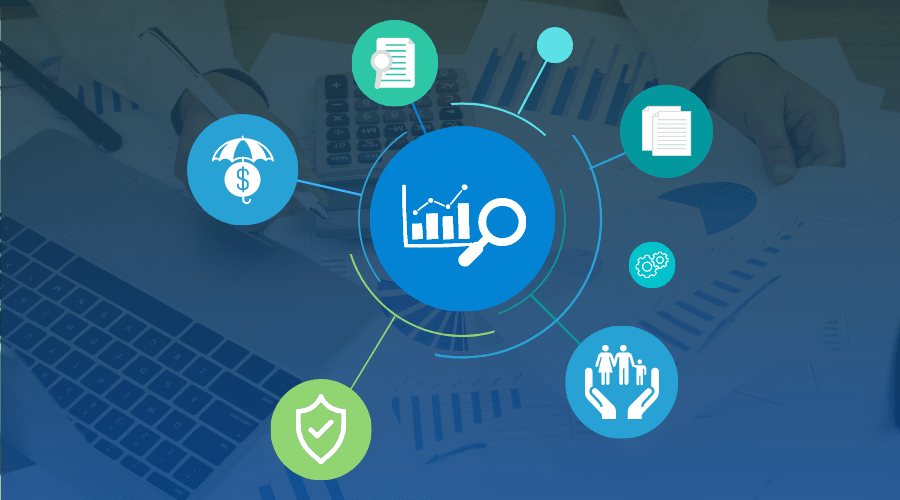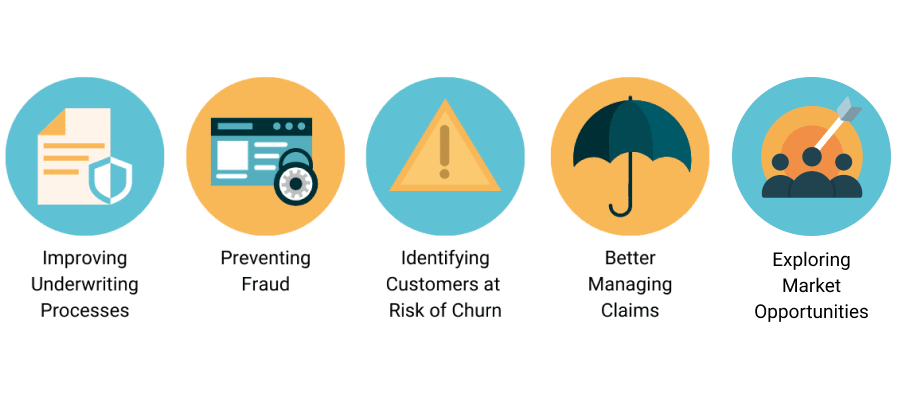Data is well on track to become one of the most valuable assets for any organization. Ultimately, it’s precisely what holds all of the key information about your prospects, leads, customers, employees, and the entire business operations.
Yet, besides having data, it’s also extremely important to use it effectively. In the insurance industry, software solutions that leverage predictive analytics and modeling are what’s going to help you do that.
You might already be familiar with data analytics in general, so today we’d like to focus on those that forecast future events. We’ll take a closer look at predictive analytics in insurance and talk about its key uses within the industry so that you can determine whether it’s something your organization should look into.
The Value of Predictive Analytics in Insurance

Predictive analytics is all about forecasting the likelihood of future events. Typically, by going through large amounts of data with the help of artificial intelligence and machine learning algorithms.
In the insurance industry, it can help predict which claims might turn out to be fraudulent or which prospects are likely to carry a higher level of risk.
In truth, insurers have already been using the basics of predictive analysis for years. It’s the cornerstone of every health, life, or auto insurance company. However, the current boost in digital transformation initiatives has made things much more efficient.
Discover how Velvetech Helped Inc. 500’s #1 Fastest-Growing Insurance Company Complete Its Technological Modernization
Predictive analytics in life insurance, for example, can significantly reduce underwriting expenses. Moreover, data-based forecasts drive positive impact on sales.
All industry players, from carriers to insurance agencies and brokerage firms, can benefit from effective predictive analytics. So, what are its main uses within the industry? Keep reading to find out.
Top Initiatives of Predictive Analytics in Insurance

Since predictive analytics tools rely on data and the insurance sector is filled with lots of it, there are many ways for these technologies to be leveraged within the industry.
While we can name many use cases of predictive analytics in insurance, many of them will intersect, so we’ll focus only on the key five that, in our opinion, are the most prominent.
1. Improving Underwriting Processes
Evaluating risk and determining the right pricing for each client is something insurance companies constantly face. Hence, any tool that helps perform this task in a more efficient manner and with higher accuracy is useful.
In the past, insurance companies would rely on a few variables to determine how to price a policy. Now, with the advance of predictive analytics, endless amounts of data points can be analyzed. Thus, helping underwriters come up with policies that are catered to each unique customer and maximize potential revenue.
Find out what are the 7 Essential Features of Insurance Policy Management Software
For example, predictive analytics in health insurance can help identify high-risk patients by automatically going through factors that precede chronic illnesses. Specifically, by looking at historical medical data, frequency of gym visits, insights from connected devices, and so on.
Learn more about Data Analytics in Healthcare
2. Identifying Customers at Risk of Churn
Another major predictive analytics use is identifying customers at risk of canceling their contracts with you.
Insurance companies can monitor customer behavior and gather intelligence during agent-client interactions. For instance, this can be managed with the help of solutions like AI-powered call analytics that alert you whenever someone is unhappy and likely to churn.
That way, insurers get the chance to send special offers to the customers at risk or get in touch to acquire feedback. Thus, alleviating possible concerns and increasing retention rates.
3. Preventing Fraud
Research shows that insurance fraud in the United States leads to about $308 billion in losses every year. That’s an astounding number that makes insurance companies highly interested in detecting deceptive activities and preventing them in time. With predictive analytics, it has become possible.
By analyzing social media and internal platforms for signs of fraudulent behavior or factors that may increase it, predictive analytics can forecast which customers might be untrustworthy.
4. Better Managing Claims
Predictive analytics can streamline the process of insurance claims management by automatically detecting claims that need to be prioritized, might require urgent attention, or have questionable validity.
As a result, employees can always focus on the most pressing tasks and deliver a better service to consumers. So, don’t forget this key benefit of predictive analytics in insurance claims and begin making the most of it today.
5. Exploring New Market Opportunities
Finally, let’s see how predictive analysis can be used in insurance to discover new potential markets and opportunities. Everything is pretty simple — the technology allows for scrutinizing various market indicators like demographics, economic factors, and consumer behavior. This way, identifying potential markets with unmet insurance needs.
Insurers can leverage analytics to forecast demand, define niche customer segments with unique insurance requirements, and better assess risks in new markets. All this enables businesses to be more agile and responsive to changing market dynamics and ensure a competitive edge.
Getting Started With Predictive Analytics Software Development
From more personalized policy pricing to better claims management processes, technologies that anticipate future events are playing a crucial role in the growth of the insurance industry.
There are many things to consider before committing to building a predictive analytics solution. Not the least of which is choosing an experienced partner that provides professional data science services and can bring your vision to life.
At Velvetech, we have vast expertise in developing custom insurance software that caters to our clients’ needs and helps them get ahead of competitors. So, if your organization is looking to build its own predictive analytics solution — don’t hesitate to reach out. Our team is always happy to help!









